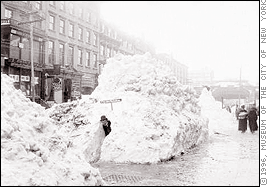The Blizzard of 1888

The Blizzard Of 1888: March 11–March 14, 1888
by Borgna Brunner
 Blizzard of 1888, 14th St. between 5th and 6th Avenues looking West, March 1888. Today's Weather Fact |
The most famous snowstorm in American history, the Blizzard of 1888, has acquired an almost legendary status. Although there have been many heavier snowfalls as well as significantly lower temperatures, the blizzard's combination of inclement conditions has been unmatched in more than a century.
The U.S. Weather Service defines a blizzard as a storm with winds of more than 35 miles an hour and snow that limits visibility to 500 feet or less. A severe blizzard is defined as having winds exceeding 45 miles an hour, visibility of a quarter mile or less, and temperatures of 10 degrees F or lower.
The "Great White Hurricane," as it was called, paralyzed the East Coast from the Chesapeake Bay to Maine. Telegraph and telephone wires snapped, isolating New York, Boston, Philadelphia, and Washington for days. Two hundred ships were grounded, and at least one hundred seamen died. Fire stations were immobilized, and property loss from fire alone was estimated at $25 million. Overall, more than 400 deaths were reported.
The days leading up to the blizzard were unseasonably mild, with temperatures in the 40s and 50s along the East Coast. Torrential rains began falling, and on March 12th the rain changed to heavy snow, temperatures plunged, and a ferocious wind began. The storm continued unabated for the next 36 hours. Sources vary, but National Weather service estimated that fifty inches of snow fell in Connecticut and Massachusetts and forty inches covered New York and New Jersey. Winds blew up to 48 miles an hour, creating snowdrifts forty to fifty feet high. The resulting transportation crisis led to the creation of the New York subway, approved in 1894 and begun in 1900.
Other notable blizzards: Armistice Day Storm(November 11–12, 1940), The Great Midwest Blizzard (January 26–27, 1967), Blizzard of 1978 (February 6–7, 1978), Superstorm of 1993—also dubbed the "Storm of the Century" (March 12–13, 1993); Blizzard of 1996 (January 7, 1996); Groundhog Day Blizzard (February 1–3, 2011).
